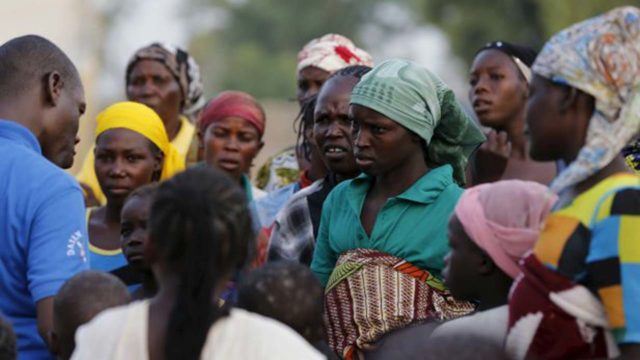
I am worried over rape and sexual exploitation of women and girls displaced by the conflict with Boko Haram who are in need of water and food. There are several reports of sexual abuses, including rape and exploitation, of women and girls living in many internally displaced persons (IDP) camps in Borno, Yobe, Adamawa states, Chad, Niger Republic and Cameroun. The victims had been displaced from several towns and villages. In 2021, the Nigerian refugee crisis will be going into its seventh year. Since violent attacks of the insurgent group, Boko Haram started to spill over Nigeria’s north-eastern frontier in 2014, Cameroun, Chad and Niger have been drawn into what has become a devastating regional conflict.
To date, the Lake Chad Basin region is grappling with a complex humanitarian emergency. Over 3.2 million people are displaced, including over 2.9 million internally displaced persons (IDPs) in north-eastern Nigeria, over 684,000 IDPs in Cameroun, Chad and Niger and 304,000 refugees in the four countries.
The crisis has been exacerbated by conflict-induced food insecurity and severe malnutrition, which have risen to critical levels in all four countries. Despite the efforts of Governments and humanitarian aid, some 12.5 million people remain in need of humanitarian assistance in the Lake Chad Basin region, with 5.3 million people remaining food insecure.
Borno State Governor, Prof. Babagana Zulum has urged the National Emergency Management Agency (NEMA) to address plights of Internally
Displaced Persons (IDPs) in camps and communities. The over a decade-long Boko Haram insurgency has claimed more than 36,000 lives with property worth over $9.2b (about N3.42tr) in Borno, Adamawa and Yobe states. Over 2.5 million IDPs are in need of food and other insurgency commodities. Food interventions must be sustained, since majority of IDPs rely on agriculture as means of their livelihoods. Most IDPs in camps and returnees cannot access their farmlands, due to terrorists’ attacks.
Legal Defence and Assistance Project (LEDAP) have said that women and girls in the Boko Haram infested North-east are randomly raped in exchange for food and water. The Project said that the incidences occurred mostly in the host communities and the Internally Displaced Persons, IDPs camps located in Borno, Adamawa, Yobe states and Abuja, the federal capital territory.
The report analyzes information collected from over 325 respondents in Borno, Adamawa, Yobe, and Abuja indicates high incidences of recurring sexual and gender based violence, forced and child marriage and sexual exploitation in exchange for food and water, which occurs with impunity in IDPS & host communities. One woman sum up her experience with this haunting words. She said, ‘I have been raped so many times that I can’t even remember’.
Several women and girls, including pregnant women, were raped, more often than not in the presence of their children, and many contracted HIV after these experiences and yet they were yet to obtain any justice for the recurring SRHR violations in the camps. Ensuring accountability and the provision of SRH information and services is central not only to an effective humanitarian response but also for fulfilling fundamental human rights obligations. The report calls on the Nigerian Government to comply with its international and regional human rights obligations in regarding access to maternal health care services to ensure women and girls affected by conflict-related violence access comprehensive medical and support services, including psychosocial support. “Also, the government should ensure that there are functioning mechanisms to monitor, investigate, and punish sexual violence and other SRH violations by state and non -state actors, even in the IDP camps and host communities.”
In addition to rape and sexual violence committed in the context of attacks on villages, many women and girls have been raped during or following displacement from their homes. These attacks have targeted women and girls travelling to displaced persons camps or to towns, leaving the relative protection of those locations to collect firewood, water or other items, and taking these goods to market to sell in exchange for necessary family items.
Women and girls are particularly at risk for rape once displaced because collecting firewood and fetching water are chores traditionally allocated to women. Most of the displaced communities living in the camps are almost entirely dependent on humanitarian aid, and there are minimal employment opportunities in the camps and towns. Collecting firewood for cooking and fodder for livestock is essential, both for family use but also because selling these items is often the only way for a family to earn any income to supplement relief assistance and purchase items otherwise unavailable, such as clothes and household necessities that were previously looted.
In IDPs, there is generally far greater freedom of movement and more opportunities for work for both men and women. Some men have found work in trade in northern towns such as Tine or short-term employment working in the fields at harvest time, in the south. However, this latter type of labour is limited and seasonal, and furthermore is restricted by increasing tensions between the refugee and host communities over strained resources. Women refugees are able to earn income in markets or as domestic servants for nearby villages. However this can put them at risk of abuse.
In a number of camps in Nigeria, women significantly outnumber men and are the de facto heads of their households. This puts even more pressure on women to find ways to earn extra income and support their families which in turn increases their exposure to sexual abuse and exploitation.
Women and girls may also be coerced by male residents of the camp and others, to provide “sexual services” in exchange for their “protection.” These women and girls may also be seen as “easily accessible” by men. “It is not safe inside the camp.
Donald writes from Yola, Adamawa State






